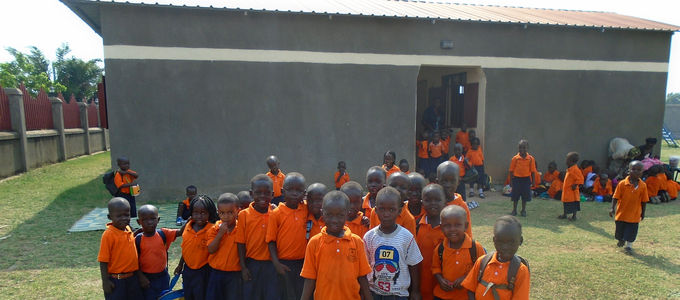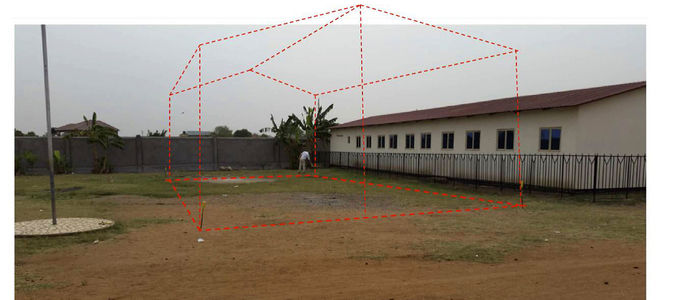Hope instead of migrating: food, energy, education

War, terror, hunger, and poverty are the reasons why many people are leaving Africa and fleeing to Europe. What can be done to help the people at home. District Evangelist Jörg Leske, director of the aid organization Nak-karitativ, gives some answers in the following interview.
More than a million refugees arrived in Germany over the past several months. Only a small number of these are from Africa. But this could soon change.
This assumption has been affecting the selection of our projects for years. There is a very critical area stretching from Nigeria via Central Africa right over to Somalia and Eritrea. The region is affected by terror and persecution, similar to what is happening in Syria and Iraq. Leaving and going to Europe is often the last chance for many to save their lives.
What are the reasons for the situation in Africa?
There are historic and political reasons, but decisive is the economy. In many countries there is close to nothing. They can barely feed the population and provide for them adequately. Add to that the population growth. It far exceeds any job opportunities there may be—if there are any at all. A huge problem is the absence of jobs. In Sub-Saharan Africa only every fifth person holds a formal job. If another 100 million young people are added to the population over the next ten years, what then? Where will these people find jobs to make a living?
The countries in Asia that have been nicknamed Asian Tigers (South Korea, Taiwan, Singapore …) were in a similar situation years ago. They managed to find solutions. Why is that not possible in Africa?
Africa is almost completely cut off from the global division of labour and economic networking: there is a lack of infrastructure and skills. The education system is a disaster. Only every third child even finishes primary school.
How can the African people find their way out of this dilemma?
The solution is: deal with two major problems at the same time.
The countries of Africa have to be empowered so that they can feed their own people. In addition to nutrition programmes, this requires a good education. Furthermore, proper infrastructure has to be put in place: streets, public administration and security, a legal system, banks, energy supply, public utilities, etc.
The next problem: in sub-Saharan Africa eighty-five per cent of the people do not have access to electricity. This complicates production and growth. The solution is to use the continent’s renewable energy sources (sun, wind, water, and biogas).
What can an organization like Nak-karitativ do to improve the situation in these countries?
South Sudan is a good example for combined activities. NAK-karitativ has been working there together with the responsible ministers from Lower Saxony (Germany) for many years to provide clean water, basic medical care, and an education. A water treatment plant was installed a number of years ago, the maintenance and operation of which is still being funded through our long-term projects. In addition to this, a medical centre was established with funding from the Ministry for Economic Cooperation. All of this is complemented by a pre-school and a primary school, which are also located in a safe area of Jubal. This is, incidentally, also where our church is located. Plans for a secondary school are in place, which is going to be built next to the primary school. It will allow students to qualify for university and improve their chances at finding a good job.
Our activities in Gambia are concentrated in an area that is still new for us. The objective is to improve waste management. To achieve this we are going to have to clear away illegal refuse dumps, build refuse containers, and operate waste collection points. First, organic waste is going to be used for the production of organic fertilizer. This is something that will sell well because it will help farmers fertilize their fields at very little cost. If everything works out as planned, a new biogas facility will be put up with competent partners to generate affordable energy. There is considerable gain: environmental awareness is promoted, long-term job opportunities are provided, and the quality of life is improved.
Regarding the topic of value chain there is a good example in Zambia. In co-operation with the American organization Profit+, we started a project in which tomatoes and other produce is processed. Tomatoes, for example, are processed into paste and ketchup, and other vegetables and fruits are dried. This allows food to be stored longer, and large crops can be used effectively. The products are sold at the local markets and in supermarkets. More than 1,400 small farmers are already involved. They receive training in how to grow vegetables and how to guarantee crop quality. Once the project is in full swing, more than 5,000 farmers will benefit from the processing facility as suppliers.
These measures have a direct bearing on improving the living conditions of the local people and offering them a perspective. This will help reduce the need to flee to Europe.












